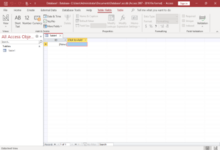 | |||||||||
 Microsoft Office Access 2021 running on Windows 10 | |||||||||
| Developer(s) | Microsoft | ||||||||
|---|---|---|---|---|---|---|---|---|---|
| Initial release | November 1992 | ||||||||
| Stable release(s) | |||||||||
| |||||||||
| Written in | C++ (back-end)[5] | ||||||||
| Operating system | Microsoft Windows | ||||||||
| Type | RDBMS | ||||||||
| License | Trialware | ||||||||
| Website | www | ||||||||
Microsoft Access is a database management system (DBMS) from Microsoft that combines the relational Access Database Engine (ACE) with a graphical user interface and software-development tools. It is a member of the Microsoft 365 suite of applications, included in the Professional and higher editions or sold separately.
Microsoft Access stores data in its own format based on the Access Database Engine (formerly Jet Database Engine). It can also import or link directly to data stored in other applications and databases.[6]
Software developers, data architects and power users can use Microsoft Access to develop application software. Like other Microsoft Office applications, Access is supported by Visual Basic for Applications (VBA), an object-based programming language that can reference a variety of objects including the legacy DAO (Data Access Objects), ActiveX Data Objects, and many other ActiveX components. Visual objects used in forms and reports expose their methods and properties in the VBA programming environment, and VBA code modules may declare and call Windows operating system operations.
Cite error: There are <ref group=lower-alpha> tags or {{efn}} templates on this page, but the references will not show without a {{reflist|group=lower-alpha}} template or {{notelist}} template (see the help page).
- ^ "Release notes for Current Channel". Microsoft Learn. Retrieved October 23, 2024.
- ^ a b "Update history for Office LTSC 2021 and Office 2021". Microsoft Learn. Retrieved October 23, 2024.
- ^ "Update history for Office for Mac". Microsoft Learn. Retrieved October 23, 2024.
- ^ "Update history for Office 2016 C2R and Office 2019". Microsoft Learn. Retrieved October 23, 2024.
- ^ "C++ in MS Office". cppcon. July 17, 2014. Archived from the original on November 7, 2019. Retrieved June 25, 2019.
- ^ "Introduction to importing and exporting data". Microsoft. Retrieved October 15, 2010.